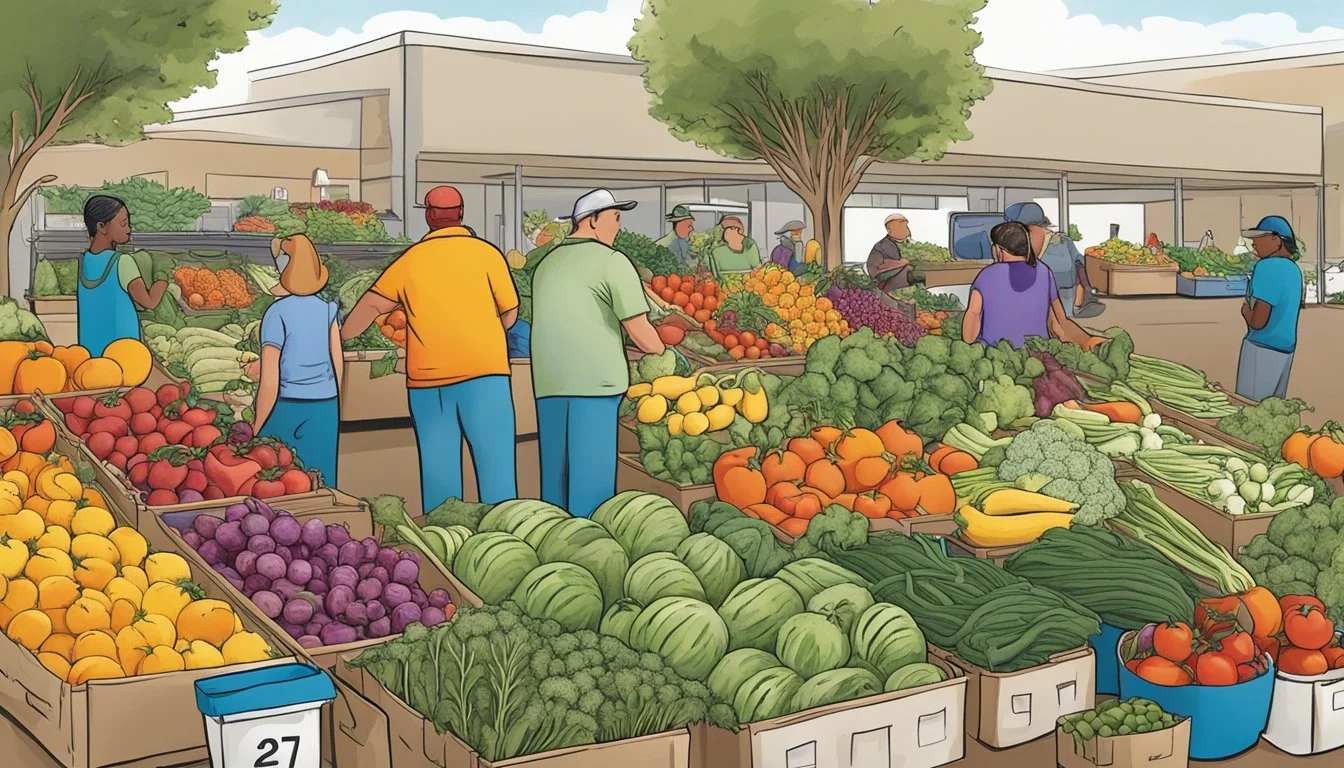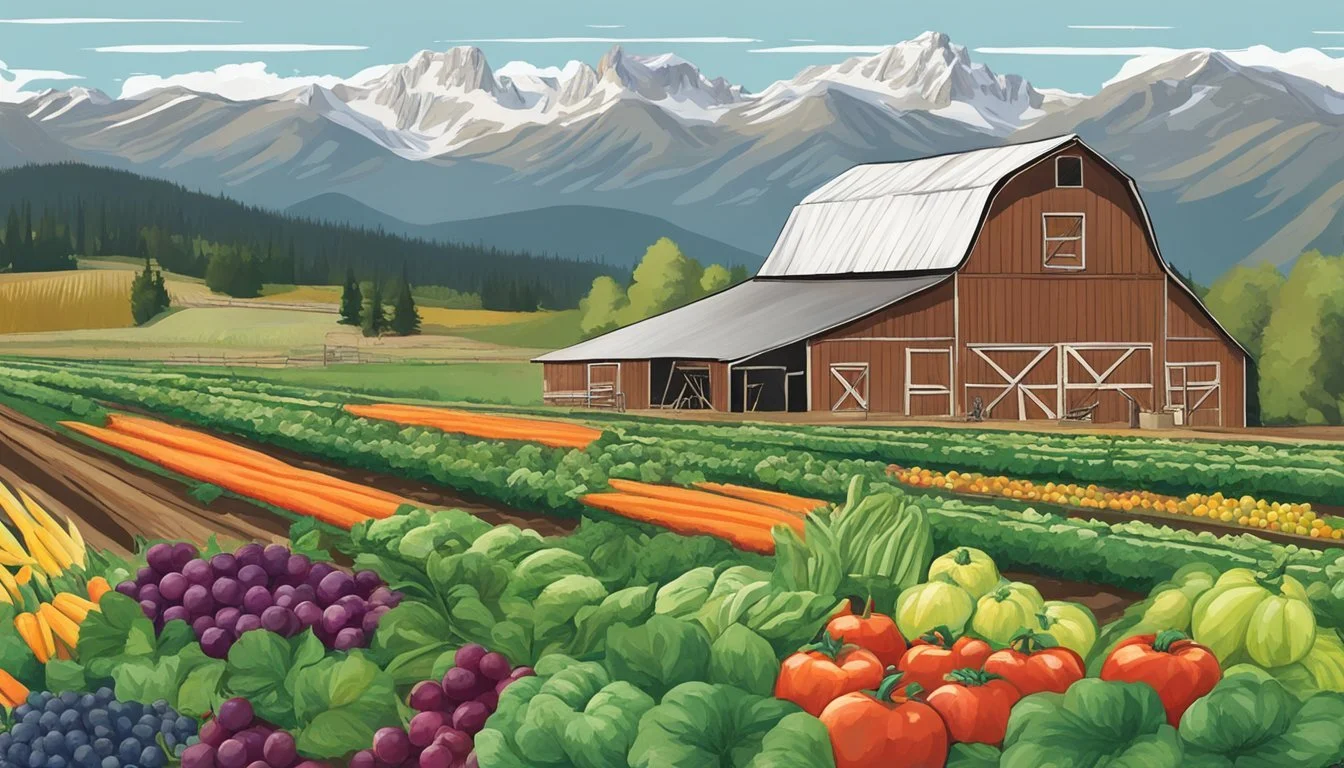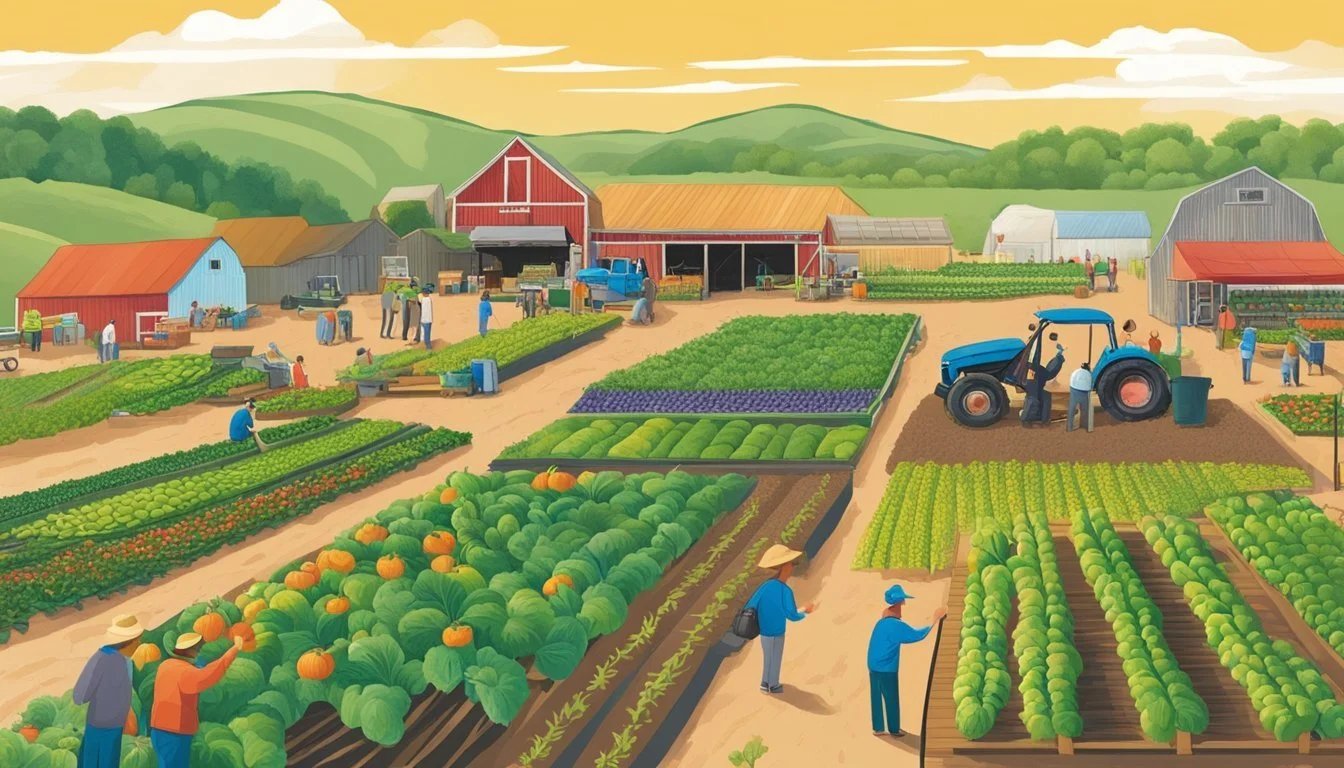Community Supported Agriculture (CSA) in Thornton, CO
A Guide to Local Produce Subscriptions
Community Supported Agriculture (CSA) is a model of food production and distribution that directly connects farmers with consumers. In Thornton, Colorado, this approach to agriculture allows community members to become shareholders or subscribers to a farm's produce. By purchasing shares at the beginning of the growing season, consumers help cover the upfront costs of farming, and in return, they receive a portion of the farm's harvest throughout the season. This system fosters a close-knit relationship between consumers and their food source, supporting local farmers and sustainable farming practices.
CSAs in Thornton are part of a vibrant local food movement that has seen considerable growth in recent years. These programs vary in size and offering, with many providing a range of fruits, vegetables, and sometimes even eggs, honey, or dairy products. The CSA model in Thornton reflects a commitment to organic farming practices, even if not all local CSAs are officially certified organic. This reflects a broader trend towards environmentally responsible farming and an investment in community health.
The benefit for consumers is not just in the form of fresh, seasonal produce but also in the knowledge that they are contributing to the local economy and sustainable food systems. The model empowers consumers to take an active role in food production, reduces the carbon footprint associated with long-distance transportation of food, and helps preserve agricultural land. Through participation in CSAs, Thornton residents are able to eat fresher, reduce waste, learn more about the process of farming, and strengthen their ties to the local farming community.
Understanding CSA
Community Supported Agriculture represents a sustainable approach to farming and food distribution. It centers around community members supporting local farms upfront, which in return allows farmers to focus on producing high-quality, environmentally responsible crops.
History and Principles
Community Supported Agriculture (CSA) has its roots in the collaborative efforts of European farmers and consumers in the 1960s, with influences from Rudolf Steiner's biodynamic farming concepts and the broader environmental movement. The CSA concept was then introduced to the United States in the 1980s by Robyn Van En, a pioneer in bringing this model to American soil. It embodies principles such as:
Shared risk and reward between the farmer and the community members
A commitment to sustainable agriculture practices
The promotion of local economic stability and community bonds
By prioritizing these principles, CSAs contribute to a more sustainable and equitable food system.
The CSA Model
The CSA model is structured around members or "shareholders" purchasing a share of a farm's projected harvest in advance. This front-loading of funds provides farmers with the necessary capital to cover the initial production costs.
Annual Membership Fees: Community members pay fees to receive a portion of the farm's yield.
Weekly Shares: Participants typically receive weekly deliveries or pick-ups of farm products during the growing season.
According to the United States Department of Agriculture (USDA), this direct-to-consumer model has seen a significant number of farms across the US adopting the CSA model. This model not only supports local farmers but also encourages organic and biodynamic farming practices — crucial aspects of sustainable agriculture.
Local CSA Farms in Thornton
Farmers in Thornton, CO, have embraced the CSA model, providing residents with fresh, locally grown produce. The commitment to sustainable farming and community enrichment is evident in the operations of Delaney Community Farm, Everitt Farms, and Gofarm. These farms embody the essence of CSA values through their practices and the variety of shares they offer.
Delaney Community Farm
Delaney Community Farm stands as a beacon of sustainable agriculture, offering shares full of organically grown produce. This farm cultivates a diverse array of crops on its productive land, ensuring that subscribers enjoy a bountiful harvest throughout the growing season. Delaney prioritizes connecting people with the origins of their food, demonstrating a genuine passion for both agriculture and community welfare.
Everitt Farms
Everitt Farms is deeply rooted in Thornton's agricultural scene, offering its community an opportunity to partake in their CSA program. Here, residents can choose from seasonally available fresh produce, directly supporting local farming endeavors. Everitt Farms maintains a close relationship with CSA members, often providing them with insights into farming techniques and the benefits of eating locally.
Gofarm
Concluding the list, Gofarm distinguishes itself with a keen focus on local food systems and providing access to high-quality, locally-sourced produce. This organization works closely with a network of farmers to supply an assortment of options to the community, making local food more accessible. Gofarm's commitment is reflected in the care taken to harvest and distribute the produce, allowing subscribers to relish the freshest flavors the land has to offer.
CSA Products and Offerings
Community Supported Agriculture in Thornton, CO, offers a diverse range of products to its members. Products range from seasonal produce typically distributed in shares to various meat and dairy offerings, and even specialty items that enrich the CSA experience.
Seasonal Produce
Members typically receive a box containing an assortment of fruits and vegetables that varies through the seasons. Shares help to support local farmers while providing community members with fresh, seasonally ripe produce. During the summer months, one may expect a variety of leafy greens, sweet corn, and stone fruits, while fall might bring squashes, apples, and root vegetables.
Meat and Dairy Offerings
Protein options within the shares can include meat selections such as grass-fed beef and sometimes poultry. The dairy offerings could range from goat dairy products to fresh milk. These offerings adhere to ethical and sustainable farming practices, ensuring high-quality and eco-friendly products.
Meat: Grass-fed beef, poultry
Dairy: Goat's cheese, Milk
Specialty Items
Alongside the regular produce, CSAs often include specialty items like eggs, flowers, and artisanal products. These additions provide a delightful surprise in each share and help support the broader agricultural community by featuring goods from other local producers.
Eggs: Often from free-range chickens, included in shares.
Flowers: Seasonal bouquets available at certain times of the year.
CSAs in Thornton, CO, pride themselves on offering a well-rounded selection to their members throughout the year, fostering a sustainable and connected local food ecosystem.
Membership and Participation
Community Supported Agriculture (CSA) in Thornton, CO offers consumers a unique opportunity to directly support local farms and build a sense of community. By becoming CSA members, individuals commit to share in the season's harvest and contribute to the sustainability of local agriculture.
Membership Fees and Structure
Membership fees in Thornton's CSA programs are typically collected annually and vary depending on the farm's size, production capabilities, and share types offered. These fees are crucial as they fund the upfront costs of farm production. In exchange, members receive a weekly or bi-weekly share of fresh produce throughout the growing season, fostering a trust-based relationship between consumers and farmers.
Community Engagement
Participation in a CSA goes beyond the exchange of goods; it's about fostering community. Members often develop a strong sense of community through their involvement. Some CSAs in Thornton encourage consumers to take an active role in decision-making processes or participate in special events, further strengthening the bond between the farm and its members.
Volunteering and Tours
CSAs in Thornton may offer a variety of participatory activities, including volunteer opportunities and farm tours. By volunteering, members can donate their time and labor, deepening their connection to the land and the food it produces. Tours allow consumers to see where their food comes from, understand the farming process, and meet the hands that grow their food, enhancing transparency and participation.
Benefits and Challenges
In Thornton, CO, Community Supported Agriculture (CSA) offers a model of local food production and distribution that favors sustainability and community engagement. This section unpacks the advantages for consumers and farmers, alongside the inherent shared risks and responsibilities of participating in a CSA.
Advantages for Consumers and Farmers
Local Food Access: Consumers have direct access to fresh, locally grown produce, supporting the local economy and reducing the carbon footprint associated with long-distance food transportation.
Supporting Local Producers: By participating in CSAs, consumers financially support local producers, which fosters a more resilient local food system and creates a more direct relationship between consumer and farmer.
Shared Risk and Responsibilities
Community Engagement: CSA members share in the risk of farming, understanding that agricultural production can be unpredictable due to factors like weather and pests.
Sustainable Production: Both consumers and producers commit to sustainable production methods, which can lead to greater environmental stewardship within the community.
CSA Practices and Techniques
Community Supported Agriculture (CSA) in Thornton, CO, employs specific methodologies centered around sustainable agriculture and food sovereignty. These practices focus on organic production without reliance on synthetic pesticides and aim to minimize food waste through integrated community efforts.
Organic and Pesticide-Free Growing
CSA farms in Thornton typically adhere to organic growing principles, eschewing synthetic pesticides in favor of natural alternatives. They employ techniques like crop rotation, green manures, and beneficial insects to manage pests and enrich the soil. Emphasizing sustainability, these practices ensure that the food is not only safe to consume but also contributes to a healthier ecosystem.
Crop Rotation: Changing the types of crops grown in each field to prevent soil depletion and pest accumulation.
Green Manures: Planting cover crops like clover and vetch that naturally enrich the soil with nitrogen.
Beneficial Insects: Introducing and nurturing insects that prey on pests, reducing the need for chemical intervention.
Food Sovereignty and Waste Reduction
Thornton’s CSA initiatives actively promote food sovereignty, empowering consumers to influence how their food is grown. They engage members in decisions ranging from seed selection to distribution, fostering a sense of community ownership. Waste reduction is achieved by aligning production closely with demand and distributing seasonal food that reflects the natural growing cycles.
Direct Distribution: Members receive food directly from the farm, which eliminates unnecessary packaging and reduces transportation emissions.
Composting: Surplus and non-marketable parts of the harvest are composted to create natural fertilizers, returning nutrients to the land and closing the loop on food waste.
Local and National Context
Community Supported Agriculture (CSA) in Thornton, Colorado, represents a critical intersection between local initiatives and national movements toward sustainable food systems. The CSA model fosters direct relationships between consumers and farmers, bolstering the local economy and contributing to a resilient agricultural sector.
Urban and Micro Farms
Thornton lies in proximity to urban farm initiatives and micro-farms that punctuate the landscape of the Denver metropolitan area. These small-scale operations exemplify the broader CSA movement by providing fresh, locally-sourced produce to community members. Micro-farms, often operating on less than five acres of land, are particularly integral in areas like Castle Rock and Colorado Springs, where they contribute to diversifying the local food market and reducing the carbon footprint associated with long-distance food transportation.
Key Points:
Urban farms and micro-farmers play a pivotal role in the CSA movement in Thornton.
Local farms provide fresh options at farmers markets and through direct subscriptions.
Impact on Local Markets
CSAs have a tangible impact on local markets within Thornton and the greater Colorado area. By offering subscriptions for seasonal produce, CSAs ensure a steady market for farmers while allowing consumers to invest in the agricultural success of their community. Farmers markets, often held weekly in Thornton and surrounding areas, see a variety of products from local CSA farms, encompassing both organic and conventionally grown items.
Farmers Markets: Venues where CSA shares are commonly sold or distributed.
Local Food: Emphasized by CSA models, local food consumption is associated with environmental and economic benefits.
Thornton's connection to the CSA movement and local agricultural markets:
Supports local farmers in the United States.
Promotes sustainable practices and community engagement.
Strengthens the link between urban consumers and rural agricultural production.
Further Resources and Engagement
For those invested in the future of Community Supported Agriculture (CSA) in Thornton, CO, there are numerous avenues for deeper involvement and education. These stem from not only local opportunities but also from networks and organizations that support CSA models at the state and national levels.
Educational Programs and Events
Massachusetts and New Hampshire provide exemplary models with robust educational programs for CSA stakeholders. Taking a cue from these states, Thornton can benefit from implementing similar educational initiatives that underscore the importance of CSA in fostering community support and cooperative efforts.
Workshops: Seasonal workshops help both new and experienced CSA members understand the nuances of organic farming, distribution challenges, and labor management.
Farm Visits: Scheduled farm visits allow subscribers and the community to engage directly with the farmers, deepening their understanding of where their food comes from.
Annual CSA Fairs: Thornton can take inspiration from the UK's CSA Network's approach by organizing local events that bring together farmers, consumers, and experts.
Support and Funding Opportunities
Sustainable Agriculture Research and Education (SARE) grants are a vital resource for those involved in CSA in North America, including Thornton. These grants can support pioneering distribution methods or community-engaging labor practices.
Grant Workshops: Local SARE-funded workshops could educate prospective applicants on how to successfully apply for funding.
Community Loans and Cooperative Investments: Following a cooperative model, community members could invest in CSAs, helping to alleviate financial burdens and securing a stake in their success.
By leveraging these resources, Thornton CSAs can enhance their educational outreach and secure financial support, ensuring their growth and sustainability within the local food system.








